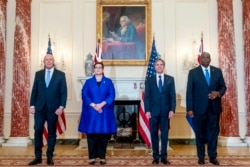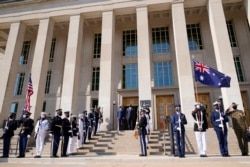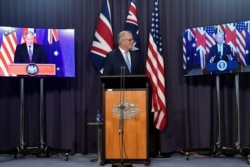Australia has signed a new Indo-Pacific security partnership with the United States and Britain to share defense technologies. American President Joe Biden announced the agreement Wednesday in a joint statement with Australian Prime Minister Scott Morrison and British Prime Minister Boris Johnson.
Biden said the three leaders understand the importance of ensuring long term peace and security in the Indo-Pacific region. “We need to be able to address both the current strategic environment in the region and how it may evolve,” he said.
The partnership is called AUKUS. The three leaders said there were several possible issues of concern that the alliance might deal with, including territorial disputes, terrorism and organized crime.
None of the leaders spoke about China in announcing the partnership. However, experts say the deal is designed to answer the possible threat China poses.
The partnership permits Australia to build nuclear-powered submarines for the first time. The government in Canberra has said the boats would not be nuclear armed.
The alliance also is to share computing technologies and cyber defenses. British leader Johnson described the three nations involved as “natural allies.”
For many years, Australia has sought security through defense and intelligence partnerships. Morrison said that his country, the U.S. and Britain had “always seen through a similar lens.” But he said the relationship had to be taken to a new level as the world grows more complex.
The ANZUS security treaty between the U.S., Australia and New Zealand, recently celebrated its 70th anniversary. Australia is also an active member of the Five Eyes alliance, which includes the U.S., Britain, Canada and New Zealand. The Five Eyes alliance was created to observe the Soviet Union after the Second World War.
Australian officials have said the nuclear-powered submarines would be completed and ready for service in the mid to late 2030s. Experts say the nuclear subs can take longer trips than other submarines. They say the boats will give the alliance a stronger military presence in the region.
Adam Band, the leader of Australia’s Greens party, criticized the deal on social media. He said it was “dangerous” because of possible accidents with the nuclear-powered ships.
Australian Prime Minister Scott Morrison said he had called the leaders of Japan and India to explain the new alliance. Japan, India, Australia and the U.S. already have an alliance known as "the Quad." Biden is planning to welcome the Quad leaders to the White House next week.
China calls deal ‘irresponsible’
China said the alliance would severely damage regional peace and security, as well as efforts to halt the spread of nuclear weapons. It said it was "highly irresponsible" for the U.S. and Britain to export the nuclear technology. It blamed Australia for a breakdown in that country’s relations with China.
China has been unhappy with the Biden administration’s criticism of human rights abuses in the Xianjing region, attacks on democracy activists in Hong Kong, and cybersecurity violations. Biden spoke by phone with China's President Xi Jinping last week. After the call, the official Xinhua News Agency reported that Xi expressed concerns that U.S. government policy toward China has caused "serious difficulties" in relations.
New Zealand is not part of the alliance
Australia's neighbor New Zealand is not part of the new alliance. It has long had a nuclear-free policy that includes a ban on nuclear-powered ships entering its ports. Prime Minister Jacinda Ardern said New Zealand was not asked to be part of the alliance and would not have expected an invitation. Still, it leaves New Zealand out of a deal to share information including artificial intelligence, cyber and underwater defense capabilities.
I’m Jill Robbins.
The story is based on reports from Nick Perry for the Associated Press and Phil Mercer for VOA News. Jill Robbins adapted it for Learning English. Caty Weaver was the editor.
________________________________________________
Words in This Story
strategic – adj. of or relating to a general plan that is created to achieve a goal in war, politics, etc., usually over a long period of time
evolve – v. to change or develop slowly often into a better, more complex, or more advanced state : to develop by a process of evolution
pose – v. to be or create (a possible threat, danger, problem, etc.)
submarine – n. a ship that can operate underwater
lens – n. a clear curved piece of glass or plastic that is used in eyeglasses, cameras, telescopes, etc., to make things look clearer, smaller, or bigger; figurative: a way of looking at something
artificial intelligence – n. an area of computer science that deals with giving machines the ability to seem like they have human intelligence
cyber– adj. relating to computers
What do you think of the agreement between the U.S., Australia and Britain? We want to hear from you. Write to us in the Comments Section.








